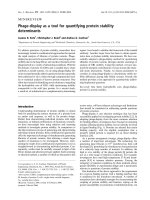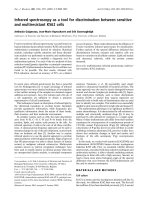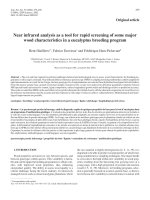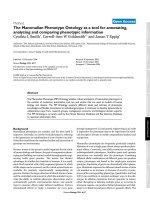Plc as a tool for marketing strategy individual assign
Bạn đang xem bản rút gọn của tài liệu. Xem và tải ngay bản đầy đủ của tài liệu tại đây (212.69 KB, 9 trang )
PLC AS A TOOL FOR MARKETING STRATEGY
Topic:
Question 1: Explain the following
a. Production concept:
Concentration to produce, in this meaning the customers will get benefits by many of
products was distributed largely with low prices. Therefore the strategy of marketing must
focus on stimulating production and distributing products. We will recognize this concept in
case the need is higher than provision. But where ever the provision is higher than the need, it
will make many problems to business.
/>b. The product line:
All goods were carried out by one business. A group of many, kind of products that
concerned to getter was made by a same process for the same goal, they were only different
by size, display or pattern.
/>c. Augmented product:
The value of an augmented product consists of:
The warranty by policy: if the goods were broken down, it would be replaced by a new
one or repaired or customers would get money back.
The maintenance policy: to provide customers some services after the time of warranty.
Customer service: including the supplement services for customers such as giving
directions, advising by phone or website.
To give more convenience for customers so they can feel more comfortable, for example: to
give laptop, carry bag, to decorate the cell phone (the front and thereat)…
To help customers are comfortable in the shopping and delivery system.
1
/>
d. Social marketing concept:
To satisfy and to ensure the social benefit of customers are society marketing concept. It is
almost a father step with marketing concept, because people believe the satisfaction of the
customers is not enough. It must pay attention to protect the benefits of society.
Question 2: Explain various concepts of marketing with suitable examples:
The Production Concept
Focus on production duties, because in this sense that customers will benefit due to the
availability and widely distributed at low prices, the marketing management should focus on
boosting production as well as product distribution. This concept is often explained by two
main reasons:
First, when demand for a product exceeds the supply, the customers will pay much attention
to getting the product to consume rather than focus on the subtle attributes of product quality.
Therefore, the company will focus on increasing the scale of production with the desire to
increase sales volume and profitability.
Second, to reduce production costs, the company will look to increase production to achieve
economies of scale and thereby expand the market.
Positive aspects of this concept are evident when demand exceeds supply. However, the
biggest drawback is the occurrence of oversupply situation (will cause excess waste due to
the absence of a sale, the revenue could not offset the cost spent); or lower price as well as
the ease of shopping (due to the wide distribution) are not the major factors to attract
customers in purchasing decisions.
The Product Concept
Focus on the products, so that customers will benefit most when offered the same quality
products of unique design with innovative features. Thus, the marketing management will
2
prioritize efforts to improve the quality of products continuously. But to ensure the effective
business, managers should be aware how to properly consider the needs and demands of
customers.
Positive aspects of this concept will promote market to have many good products, but it will
have difficulties due to appearing risks of alternative products increased, and customers will
buy the alternative products with better uses and benefits instead of choosing high quality
products but less efficiency.
The Selling Concept
Focus on the task of selling, because it can attract customers and if not actively selling and
implementing strong promotions, customers will not buy all products.
This concept is applied strongly to detect the prospective customers and pressed by
convinced of the benefits, as unsought goods that normally buyers do not think the premium,
functional foods... or sought goods but expensive as houses, cars...
The downside of this concept is making many potential customers to be surrounded by the
advertising, promotion too much, so it will make them feel at any time, any place there are
people trying to sell a something, and they will shy away .
The Marketing Concept
This is one of the cornerstones of the modern business concepts. Marketing concept confirms
the key to achieve the objectives of the organization to lie in determining the needs and wants
of the target markets, and distributing the satisfaction effectively than competitors.
This concept focuses on the satisfaction of the consumers to bring success, so the company
should only offer products under customers’ desire. However, its drawback is not to pay
attention to social welfare.
The Societal Marketing Concept
Not only bring customer satisfaction but also to ensure the social benefits, it is the societal
marketing concept. This is almost a step further than the marketing concept, because it was
believed that only the satisfaction of consumers is not enough, but must also focus on
protecting the interests of the whole society.
Before the companies have made marketing major decisions based on profit but now
satisfying customer needs and perceptions of the importance of the social benefits have been
focusing more and more. As a result, marketing activities will be significantly better with the
longer-term benefits.
3
Question 5: Explain process of selecting the final price:
The companies must establish a price for the first time when developing a new product, when
introduced into a new distribution channel or geographical area. This is usually done as
follows:
- Identify target market segments for products or services, with expectations to
achieve and how to deliver products or services to access it.
- Establish the level of consumer prices for the target market segment.
- Check prices (and costs if possible) of the actual or potential competitors.
- Check prices range from the different levels of quality or product delivery method.
- Identify profitable could get at each price.
- If low profits, to change specifications of products to reduce the cost to generate the
desired profit.
The order to set pricing policies:
1. Selecting the Pricing Objective
This is the most important stage. The clearer objectives, the easier setting prices. Five major
objectives through pricing are: The survival of the companies, the maximum profit,
maximum market share, maximum surf market, and product quality management. Although
specific objectives, the companies use price as a strategic tool that will benefit more than the
companies simply for cost or market valuation of their products.
Example: Sony is one company that has experienced surf market. They sell very high price
when launching a high technology product to market for consumer groups having a lot of
money (premium segment), and the purchasing power decline in this segment, they will
reduce the price to attract purchasing power in lower market segments.
2. Determining the demand
The next stage is to identify needs. Each price level will create different needs towards be
inversely proportional to each other and have different impacts on marketing objectives.
Most customers are sensitive to the price of the products of the essential goods. A seller can
charge a higher price than competitors and still sell as long as the customers can own with the
lowest cost.
The process of estimating demand, leading to:
i) Estimation of sensitivity;
ii) Evaluation and analysis of the demand;
iii) Determination of the price elasticity of demand.
4
3. Estimating Costs
Cost of products include: costs for production, distribution and sale of products (including
the favorable factors and risks). This cost depends on each different production levels.
4. Analyzing competitor's costs, prices and offers
This is an important factor in setting prices. This stage depends on market demand and the
cost of the products, the cost of competitors and the reaction may be of price. In particular, if
the poor products or services, the companies will not be calculated as high as their
competitors, on the other hand they can also change prices to compete with the cost of the
companies.
5. Selecting a pricing method
There are three pricing methods be used: 1) Costs oriented prices; 2) Competitors oriented
prices; 3) Marketing oriented prices.
Costs oriented prices: Two methods are commonly used:
Full costs: Synthetic full costs associated, however this method has weaknesses lead to an
increase in prices, as opposed to the affordability of potential customers.
Direct costs: Only for the costs are to increase as production increased, helping determine the
lowest price to increase profits while reducing prices to increase sales during peak hours. For
example, the discount for the vacant seats on the plane is to attract more passengers.
Competitors oriented prices:
Market pricing: Based largely on prices of competitors, may equal, more than, or less than
competitors. In case of pricing higher than competitors, the companies need through the
delivery schedule or quality of services to justify a higher selling price.
Competitive bidding: The buyers will choose the lowest cost providers.
Marketing oriented prices: The price of a product is set to match the marketing strategy. For
new products, prices will depend on locations and strategies; existing products will be
affected by strategic objectives.
6. Selecting the final Price
This stage is to narrow down the companies’ choices in its final prices, to consider additional
factors such as psychological prices, favorable and risk prices, the impact of marketing,
company policies and effects, the impact on market prices.
Question 8: Explain “direct marketing” and its applicability with examples:
To day, market is a spinal operation on business. In the past, the products go straight from
producer to customer. Now a day, a new technique of selling that concerns to communicate
5
with potential customers by presenting product directly to customers on TV, radio… and
sending catalog, advertising email, text message, advertising on line. All of them were called
direct marketing. With the feed back of information, business which wants to sell product can
collect requirements of customers. With the provision and collect the two ways information
about promotion program, decreasing price … so business can develop good relationship
with customers.
Direct marketing brings many advantages to customer: Fitting with active life saving time for
shopping, a lot of new products to choose, flexible in shopping. With business direct
marketing will make easy for the orders, collecting a lot of customer information rapidly. On
the other side, it can guarantee the privacy and the “Stealth” strategy with the competitors, to
help using resources effectively.
Direct marketing includes:
- Direct mail: to customers in locations or in lost of business, through post office:
- Email marketing
- Door to door leaflet marketing. This form concentrates entirely in the area.
- Direct response TV marketing with long form (about 30 minutes) to describe product in
detail, short form (30 sec or 01 minute) to make the feed back of customer clearly.
- Telemarketing: by phone to help consumers have opportunity to contact the marketing
manager any distance, time, weather.
- Couponing: use to collect the information back from customers by the coupons.
- Direct selling: sale men will meet customers directly.
- Integrated campaigns: combination of the forms listed above to get the best result for the
firm. Some examples:
In direct selling: employee of insurance company or employee selling of the
supplement nutrition to see customers directly to pursuance them to buy their product
or their service with the real estate company, they sent email, text message and invited
potential customers to see prototype house (with plans going to construct) or to see
apartment (with plans that be finished).
On line business: the business create website to introduce their company and sell their
products online.
6
In generally speaking, the goal of marketing is to help customers to know about products, the
benefit can satisfy the buyer’ need with the attraction, the innovation and the specialty of
products.
Direct marketing a part of selling product and marketing “Mix” were not magic chopstick or
can be suitable for every product and service. A kind of product and service or a business
brand name has its character, each business or manager has different goal of running
business. To succeed in direct marketing, the managers do not limit this one like a main
selling mean, they have to build a structure for brand name. Combination between multiple
requirements and intelligent opinions of customers with right policy and the correct
marketing goals, business will define its commercial name and can sell more and products or
services.
/> />54933.html .
/> />nam.aspx
Question 4: “PLC as a tool for marketing strategy” justify
The following chart indicates the stages of “The Product Life Cycle” with the characters of
marketing strategies and their effectiveness:
7
Introduction Stage: This is the initial stage, customers do not know or do not know much
about the products, the companies have a lot of costs to introduce and advertise products on
the market.
However, if the companies implement pricing strategies, product positioning error would
create the risk of reducing the value of the products. In terms of market size is too small will
not be able to have good sales, so the companies must rethink marketing strategies if the
market uncertainty. Target customers who are interested in exploring and experimenting, and
they always want to be the first to use the products.
Growth Stage: After the initial stage, many customers were interested in those products due
to their value brought, as well as from the effects of marketing activities and through the
targeted customers. The property of products becomes a great demand, the number of
products sold will increase, the companies will have greater revenue and profitability. When
products are dominant and dominant market, they will bring the biggest profit margin.
Maturity Stage: After the development stage, the number of customers has owned high
products, so the attractiveness of the products is not as large as before and the demand for
products gradually becomes saturated. Sales will be leveled off and begun to decline over
time due to the emergence of many competitors, loss of market share or products unfit for
consumers. At this stage, the companies need to deploy marketing strategies for new products
or for the lifetime of the product line instead.
Decline Stage: Products have become too familiar and not so attractive, so consumers have
been boring and appeared psychological to want more new products and more features. So
this time, purchases fell, sharply increased cost of sales and reduced profits. The companies
should reduce the price to attract customers in lower segment and to have revenue in the
period.
The following table showed the stages in the life cycle of the products and the features
associated with marketing requirements and their effectiveness.
8
/>San-Pham.aspx
/>images/product-life-cycle-stages/
9









